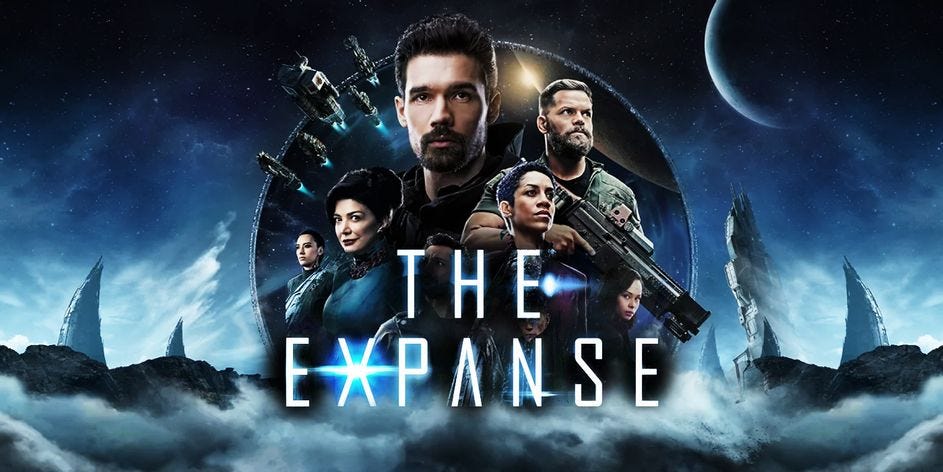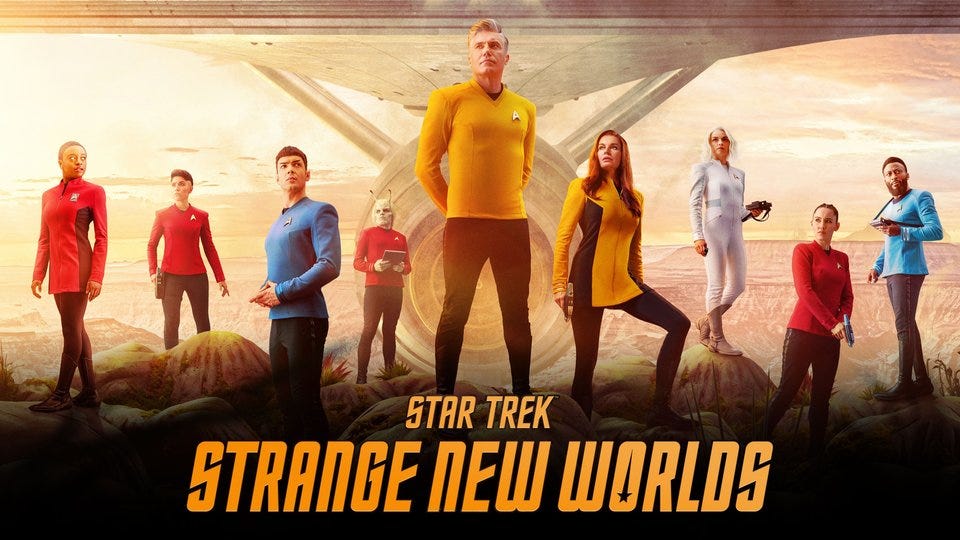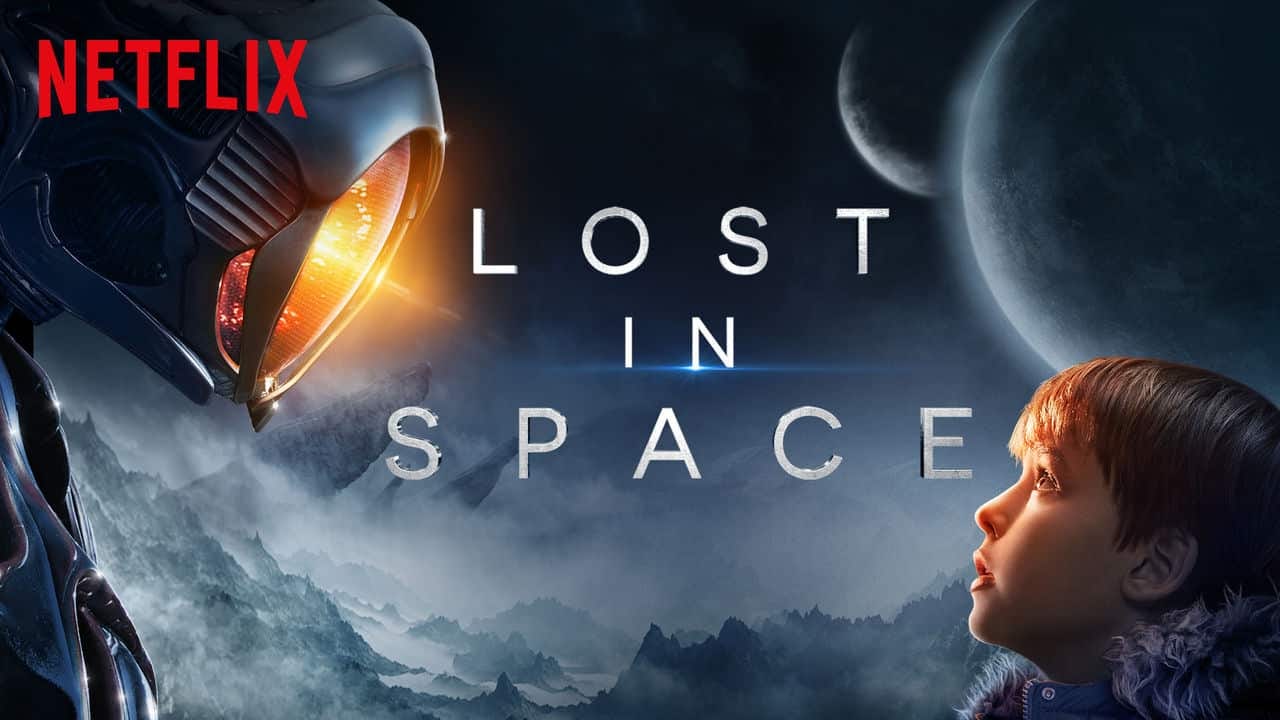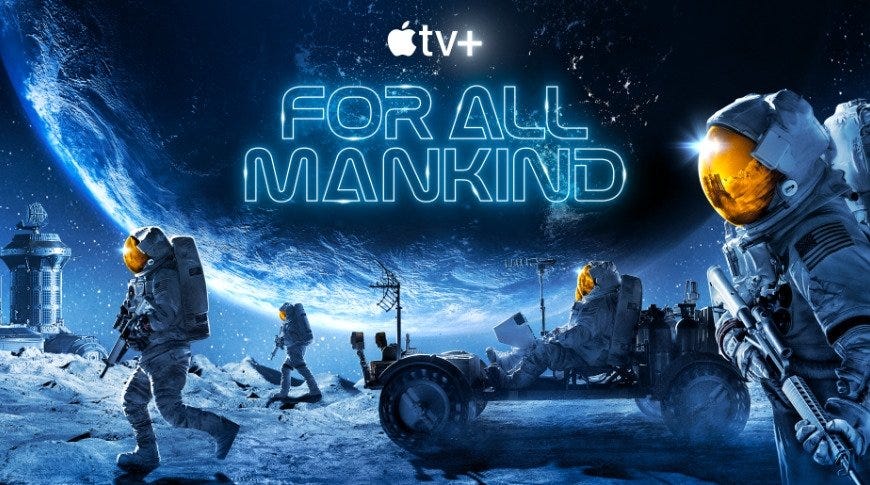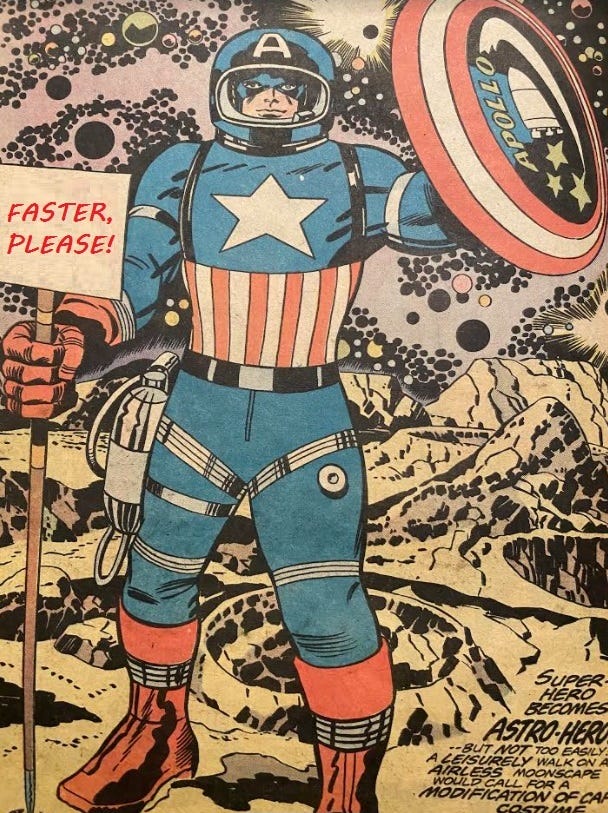🚀 The 5 most future-optimistic sci-fi shows on television
Also: A replay of my chat with Ronald D. Moore, creator of 'For All Mankind' and 'Battlestar Galactica'
What’s the most pro-progress, future-optimistic sci-fi show on television today? And why is the correct answer For All Mankind on Apple TV+?
Before I answer those questions, let me briefly state why they’re worth asking: It’s important that our culture create aspirational and inspirational visions of the future. Underlying the rapid advance of human progress over the past quarter-millennium has been a powerful optimism about tomorrow combined with what sociologist Elise Boulding has described as a “utopian sense of human empowerment.” We have to believe that the inevitable disruption caused by progress will be worth it — if we make the right decisions.
We also need to believe that we can invent, broadly, the future we want. Right now, however, it seems we think that we’ve carelessly created a future that our kids and grandkids won’t want — a future of rising temperatures and rising inequality. And since the early 1970s, Hollywood has both reflected and encouraged that gloomy belief. But sci-fi could again be pro-progress and future-optimistic (what I call “Up Wing”). It could have plenty of dramatic tension while also showing a path toward a better, although still imperfect, world.
Here are the top five television shows, either ongoing or just ended, that depict such a future world.
1. For All Mankind. The 1960s Space Race never ended in the show’s alternate timeline. And neither did the Soviet Union, which lands on the Moon first. Or to put it another way, global technological competition — and progress — just keep going. Both nations get a deep and invigorating sense of national mission from their (mostly) peaceful duel in the heavens. There’s no Great Stagnation in either country. By the early 1980s, both have lunar bases, and Americans are using cell phones and driving electric cars.
One episode into its third season, which premiered last week, For All Mankind has leaped forward to the early 1990s, though viewers are given a brief recap of what happened over the previous decade. Among the historic happenings:
In 1984, President Ronald Reagan, first elected in 1976, finishes his second term wildly popular, thanks to a historic US-USSR lunar peace treaty that effectively divides the Moon between the two nations. That treaty and the promise of an economic boom fueled by Moon mining sends Reagan’s approval ratings soaring.
In 1986, Mikhail Gorbachev becomes the new Soviet leader and his policies put the Soviet economy into “hyperdrive,” leading to growing communist influence across Central and South America. The Portland Trailblazers take Michael Jordan with the first pick in the NBA draft. There’s a breakthrough in nuclear fusion. Argentina loses to England in the quarterfinals of the 1986 World Cup because of an illegal hand goal by footballer Diego Maradona. (“The Foul of the Century!”) The first private space tours begin.
In 1988, President Gary Hart wins landslide reelection over Republican nominee Pat Robertson. NASA’s James Hansen testifies to Congress that global warming has slowed due to widespread use of nuclear fusion.
In 1990, real-estate developer Donald Trump meets with Gorbachev hoping to build a luxury condominium in Moscow. Polaris space tours announces that it's building a hotel in orbit. President Hart declines to intervene in Iraq’s invasion of Kuwait.
Much of this season will seemingly revolve around the space race to Mars by mid decade. It should be a great ride. But that’s not the only reason the critically acclaimed For All Mankind tops my list. It doesn’t present a problem-free world. In season two, a key plot development is a riff on the Cuban Missile Crisis — except this time it’s the Soviets running a quarantine of the Moon in 1983. Most notably, the Evil Empire isn’t collapsing. (Although it wouldn’t surprise me if Gorby was leading the USSR toward a Scandinavian-style social democracy as the real-life leader apparently wanted.)
But we’ve solved climate change and gone a long way toward preventing another existential threat: a big chunk of rock or ice slamming into Earth and ending life here. In the world of For All Mankind, we’d probably be able to deflect it or survive as a multiplanetary civilization. The America of For All Mankind is also more liberal than real 1990s America in the best sense of the word. For instance, the success of female astronauts has accelerated gender equality.
My version of Up Wing politics and policy is about making a better world through technological progress and economic growth. But I don’t expect those living in a world of greater prosperity and longer healthspans, of abundant clean energy and a vibrant space economy, even a world of hyperloops and space elevators, to be living in a utopia. Not when those same inhabitants are still flawed humans. Not even with 4 percent real GDP growth and Mars colonies. My goal is progress, not perfection. This well-known quote from The Martian captures the Up Wing spirit: “You solve one problem and you solve the next one and then the next. And if you solve enough problems, you get to come home.” Similarly, For All Mankind is a show about solving problems and moving forward.
2. The Expanse. Surely a controversial pick to some, but I see it as obviously Up Wing. Based on the book series of the same name, The Expanse is set in the 2350s when humanity has colonized the Solar System. The average lifespan on Earth — governed by a democratic world government — is 123 years, Mars has three billion inhabitants, and deep space asteroids — easily accessible due to superspeed fusion spacedrives — are mined for their riches.
Critics will point to various problems in the Expanse-verse as undermining my optimistic thesis. Climate change has raised sea levels (Manhattan is surrounded by a sea wall), the population has exploded to 30 billion, and half of adults are jobless, receiving a basic income payment. But much of this is flawed world-building and dodgy economics. On our Earth, for instance, current demographic trends suggest global population decline is far more likely than explosion. What’s more, all the advanced technology — AI, robots, fusion, genetics — should have made humanity far richer and more productive (and able to pull carbon out of the air). Finally, there should be plenty of work for everyone, both down here and up there. While AI and robotics have improved a lot, they don’t seem so capable as to make carbon-based workers redundant. For example: Martian space battleships each have a crew of 3,000 sailors. That’s about the same as ocean-going battleships during World War II.
It’s also worth noting that humanity in The Expanse did not destroy itself through climate change, man-made pandemics, unaligned AI, or nuclear war. Not a bad accomplishment given the high odds some experts assign to those threats. The show has ended its six-season run on Netflix last January, but there’s plenty more book series material to mine. Perhaps The Expanse will eventually get more seasons.
3. Star Trek: Strange New Worlds. I frequently ask my 5 Quick Questions interviewees about their favorite future-optimistic film, TV show, or book. Not surprisingly, some incarnation of Star Trek frequently gets a mention. The Trek universe is one where humanity overcomes its worst impulses and sets sail on a journey of interstellar discovery. As series creator Gene Roddenberry once put it, “The human race is a remarkable creature, one with great potential, and I hope that Star Trek has helped to show us what we can be if we believe in ourselves and our abilities.” That ethos permeates everything Trek, including the four spin-offs currently in production.
But it’s the newest incarnation, Strange New Worlds, that makes this list. Here are the voyages of the USS Enterprise, under the command of Captain Christopher Pike, immediate predecessor to James Kirk. Right from the opening credits, with updated versions of the classic Trek theme and “boldly go where no person has gone before” mission statement, SNW lets viewers know that it aims to recapture the spirit of the original 1960s series. And midway through its first season on Paramount+, SNW is delivering. That, thanks in no small part to actor Anson Mount who portrays Pike as simply having a marvelous time occupying the captain’s chair. (Well, at least when he’s not in his quarters brooding about his doomed future.)
The third episode provides a good example of SNW’s vibe. Like a good ST: The Original Series episode, the captain (but Pike rather than Kirk) and Mr. Spock are stuck on a dangerous planet while some mysterious malady affects the Enterprise crew in orbit. The resolution to both crises suggests the United Federation of Planets’ ban on genetic editing might be a bad idea. Pretty tech positive stuff.
4. Lost in Space. The 2018 Netflix reimaging of that other popular 1960s sci-fi show probably owes more to The Martian than it does to the cheesy, low-budget original. Yes, the Robinson Family — parents John and Maureen, kids Judy, Penny, and Will — are back, as is the villainous Doctor Smith and always helpful Robot. And they’re still lost somewhere out there in deep space.
But there are lots of differences, some big, some small. And all of them make for a more compelling show. The brilliant Penny is a step-daughter, Doctor Smith has been gender swapped, and Robot has been manufactured by aliens. In the first season, the family is more stranded than lost, stuck on a distant planet. They’re also not stuck there alone. The Robinsons are part of a group of families on a mission to colonize the Alpha Centauri planetary system in the year 2046. When disaster strikes the mother ship en route, the families escape to a local Earth-like planet in their Jupiter flying saucers.
Solutionist, Up Wing thinking is built into the very premise. The colonization mission is prompted not by anthropogenic climate change ravaging the Earth, but by a climate-ruining asteroid strike. So a lack of technological expertise, not too much technology, is to blame here. More to the point, most of the drama during the first season comes from tough circumstances, not bad buys. Like The Martian — and maybe MacGyver — the Robinson Family has to solve technical problem after problem to survive. There's a “maker” ethos embedded in the show’s DNA. I mean, of course the Robinsons’ handy 3D printer plays a key role throughout. And since the show is set only a quarter century from now, problems are solved through understandable ingenuity and (mostly) realistic tech, not superscience. The third and final season was released in December 2021.
5. Return to Space. Nothing makes me feel like I’m no longer stuck in the post-Apollo, Great Productivity Downshift Era than watching a SpaceX launch. And it’s not just that all launches are pretty cool, especially ones where the first-stage boosters return to Earth with a perfect landing. I feel as if I’m watching only the first step of many more to come.
That wasn’t the case with the Space Shuttle. It wasn’t at all clear that the space truck was leading anywhere, not even to a space economy, much less to a Solar System-spanning civilization. But SpaceX launches seem to signal the start of something much bigger. And the story of how Elon Musk, SpaceX, and America took a leap back into space between 2011 and 2020 is told vividly in the two-hour Netflix documentary, Return to Space, which premiered in April.
As I wrote not long ago, “The film has been criticized by some as too laudatory. But given that SpaceX is reigniting a dream of space abandoned a half century ago, future documentary watchers might not see it as laudatory enough.” It’s a well-told story of congressional skepticism about the private sector and space, the successful fourth launch of the Falcon rocket that saves the company, the key innovation of rocket reusability, and Musk’s unshakeable focus on eventually getting to Mars. As Musk finishes the documentary:
It’s very important to appreciate this is not inevitable. People are mistaken when they think technology just automatically improves. It does not automatically improve. If you look at great civilizations like ancient Egypt and they were able to make the pyramids. And they forgot how to do that. And the Romans, they built these incredible aqueducts. They forgot how to do it. In 1969 we were able to send somebody to the moon. And we forgot how to do that. The window of opportunity is open right now to make life multiplanetary. But we cannot count it being open for a long time. We need to take advantage of that window while it is open.
A replay of my chat with Ronald D. Moore, creator of 'For All Mankind" and 'Battlestar Galactica'
Ronald D. Moore, co-creator of For All Mankind, has worked on a wide variety of TV shows over the past few decades, including Star Trek: The Next Generation, Deep Space Nine, and Voyager. He’s also the creator of Outlander and, of course, co-creator of 2004’s Battlestar Galactica. Back in October 2020, just before the second season of Mankind, we had a long podcast chat. This is an edited, partial transcript of that delightful conversation:
What are the roots of For All Mankind?
Zack Van Amburg, an executive at Sony Studios for years, and I talked some time in the distant past about doing a show set at NASA in the Skylab era. Nothing ever happened about it. Then flash forward to when Zack took over the reins as one of the co-chairs at Apple TV+. He calls me up and says, “I still think about that show we talked about doing — the show at NASA in the ’70s. What if we did it? What if we did a Mad Men-style show at NASA in the ’70s?” I got excited about it, “Oh, that’s really cool,” because I was a big space buff.
But the more I thought about it, the more I realized that while you could do that as a character piece with NASA in the background, the story of the space program of those years, in my opinion, was kind of a depressing one. It was about budgets getting cut back, the horizon getting closer and closer. The big ambitions about having moon bases and more space stations and going to Mars all just kind of went away.
The show I wanted to do was the space program that we didn’t get. The one that I was promised growing up as a kid, where we did all those things, the Apollo kept going, the space race continued, and we went out into space and beyond more aggressively and with greater ambition.
So then it became, “All right, how could that have happened? Why would that have happened?” As I thought about it, it became clear that one of the ways it could’ve happened was if the Soviets had beaten us to the Moon. Instead of us getting to the Moon and saying, “Yay, us, USA, USA, we did it! Okay, now let’s just pack our bags and go home” — if we’d been beaten at the last minute by our arch-rival, it would’ve spurred us and pissed us off and made us redouble our efforts. As if to say, “Now we’re really going to the moon, and now we’re going to do all these other things because we’re so angry and so upset about getting beaten at the last minute.”
It was always sort of meant to be an aspirational show because I just wanted to play that story of what I thought the space program was going to be and what it could’ve been, and then it was a question of, well, how could we get there? That’s how the Soviets beating us came up.
Is it possible to have something like the space program — where it’s not going to be obvious to people why this really matters for their everyday lives — without some sort of external force driving it? In the case of Apollo, there was the race between the US and the USSR, democracy versus communism
I think it’s certainly harder now than it would’ve been if we had kept going then. And this is the premise of the show: If the national effort had continued in the moment and had kept going, it could’ve been a “loss leader,” in a sense. The benefits may not have been immediately apparent. But if we had just kept going long enough, we would have gotten to where we are now, where you see business and commercial interests coming in, you start to see public/private partnerships, and you start seeing the diversification of what it means to go into space. Once you start getting into space tourism and you start getting into places where there’s money to be made in manufacturing or mining of the moon, asteroids, or other planets, you start seeing other benefits on Earth and you start to see technological change coming about on Earth because of the space program. It’ll start to build upon itself.
If that had happened, like it did in the show, I think it could’ve all played because the national effort would lead everything, then private industry gets in, and then we’re in an active, ongoing space program. Then it’s not so much about “How much money is Congress spending every year?” It doesn’t get bogged down in whose district is supporting what aspect of the space program and everybody arguing, “Why are we spending money on space when we have people who need the money here on Earth?” — which is where we are.
If you could’ve avoided that and gotten to the place where the national effort pulled along the private enterprise into space, then the national effort can recede and can become more about pure science and about true exploration. Then things like moon colonies, space stations, and literal space tourism — just getting people to see the benefits of space and the spin-off technologies —it all just becomes part of life. It’s not coming from the space program, per se. There’s access to space, there are things that are happening in space, people aspire to work in space or possibly live in space. And they know when something’s gotten from space. It’s, like, we could get to that future, but the path that we took was just so complicated because we did step back at the moment of victory, and it’s made it much harder to now rekindle that interest. Because how can you top Neil Armstrong?
Do you personally care about a space program that isn’t just factories in space but also one that pursues manned exploration beyond the moon, beyond Mars — that someday there’ll be a Discovery 1, like in 2001: A Space Odyssey, headed toward Jupiter?
I do care about that. I subscribe to that aspect of space travel. You can say that’s because I grew up with science fiction and the early Apollo and all that, and that’s all absolutely true. I have that gene that hears that call that wants to fly, that wants to look up at the night sky and say, “I wonder what that glowing point of light is. I want to go see what’s there.” There is a pull that speaks to me very deeply about wanting to go out there, explore, and go find those things. I feel like that taps into a basic human thing that’s always been with us. Why do we go across the ocean? Why do we climb the mountain? All these things are clichés that we talk about when we compare it to space travel, but they’re clichés for a reason because it does speak to that same basic human impulse.
There’s a reason why in 2001, the movie, when the ape-man throws the bone up in the air, it becomes a spaceship: Because it is a tool to an idea, and once you invented tools, you want to go somewhere. The tools should take you to something. You start to reach out and explore. So, for me, manned space flight is a very important thing. I really get excited about the idea of people going to Mars, going to Saturn, going out somehow beyond the solar system, going into deep space. It’s like there’s a huge universe out there, and we’re just sitting here tooling around the same big ball of mud for millennia.
Do you think our culture produces too many dystopian stories? If so, do you think it matters?
I agree with both questions. I think we do have too many dystopian future worlds, and I think it does matter. It’s a little easier to write a dystopian piece, in all honesty. It’s easier to make things really crappy and show people at their worst. You know, “What if this disaster had happened and all the people are dead except for… .” It’s really easy to go to those places because it’s a natural place of drama.
It’s harder to write Star Trek, which is why there’s really no other competitor for Star Trek in terms of what we’re talking about. Trek stands alone in its optimistic idea of the future, at least in terms of pop culture science fiction on film and television. There’s really nothing else, and Trek kind of owns that space. Not only did it say, “Here’s an optimistic vision of the future,” but it’s a future that probably almost everybody now buys into. If you ask people what they hope the future’s going to look like, they’re probably going to describe a future that’s very much like Star Trek: a world that conquers disease, poverty, and racial tension; nations no longer go to war with each other; and we go out into the galaxy in peace and for freedom, representing democratic values. That’s the dream, and that’s what Trek is all about. It’s harder to find drama in that situation. It’s harder to figure out what the conflict is. You have to work a little bit more. So it’s a little easier just as a writer to draw up the dystopian scenario.
When I was working at Next Generation and Deep Space Nine, people were constantly coming to us who worked at NASA or worked in Silicon Valley. They had gotten into those professions because they were inspired by Star Trek because they either wanted to be astronauts or they wanted to be engineers or wanted to make a transporter. They just were so inspired and excited by the ideas that they saw in that vision of the future that they literally dedicated themselves to doing it. We need to provide that for people. We need to give people that kind of hope and that kind of inspiration if we want them to achieve those things because I think culture is very powerful. It does influence how we think and how we behave and what we achieve.
Is there much appetite today for that kind of optimistic content?
I think there is, and sometimes the business is slow to pick up on what there’s a market for and what kind of appetite there is. A classic example is during the Depression when suddenly everyone just wanted to go to the movies and watch something optimistic and carefree and forget about their troubles, and then Hollywood serves that appetite. You just need one of these things — some optimistic piece — to catch people’s attention, and then suddenly you’re going to be inundated with 50 of them.
Right now, it’s just that shows like Walking Dead. Nothing against Walking Dead, but Walking Dead and shows like that have gotten so much viewership that everybody just piles on. Hollywood is just very imitative, and when they see success over there, they just keep shoveling more and more and more of that out to the audience because the audience is eating it up. But, eventually, you get to a saturation point, and then it’s like, “Enough already. I don’t want to watch another zombie piece.” Then somebody offers you something completely different, and the audience will flood over there.
The tech billionaire Peter Thiel, who’s a science fiction fan, has said, “I’m a capitalist. Star Wars is the capitalist show. Star Trek is the communist one. There’s no money in Star Trek, because you have the transporter machine that can make anything you need. The whole plot of Star Wars starts with Han Solo having his debt that he owed, so the plot of ‘Star Wars’ is driven by money.” Does he have a point?
Moore: He’s … not wrong. But I can tell you that those of us who worked at Star Trek completely dismissed that aspect of the show. Even those of us in the writer’s room would go, “What does this mean, there’s no money? How does this work? How does any of this function without money?”
In the original series, Kirk would say things like, “Scotty, I’m docking your pay for the next month,” and they had credits and they had bar tabs. There was some currency. There was some way that people were compensated for things, and “mining rights” meant something. It was only in the later incarnations when Gene, who I only worked with briefly when I came aboard. Gene had kind of bought into his own press release that he was a visionary, and he just decided that in the 24th century, there was no money and people “work to better ourselves,” I think Picard says at one point.
All of us on the show just went, “I don’t know what that means, so let’s just ignore it as best we can.” In fact, we even made fun of it once. In Deep Space Nine, there was an episode called “In the Cards.” There’s a conversation between Jake and Nog. Jake says, “You need to get some latinum because we humans don’t have any money.” Nog’s like, “Yeah, how does that work?” “We work to better ourselves,” says Jake. And Nog says, “Yeah, what does that mean exactly?” Jake pauses and he just looks at him, he says, “It means we don’t have money.” It’s the only explanation.
Can Hollywood do a better job of showing an optimistic future to help to help instill that attitude in our kids today and future generations?
I think we should try to produce those things as best we can. But nothing is as powerful as the culture that we personally, as parents, pass down to our children in terms of shows that we’ve showed to them, the films we take them to, the games we give them to play, and the stories that we just share with them. Which is not to say that they can’t watch Walking Dead when they get to a certain age. But it’s giving them a bigger diet than that and showing them something that’ll make them go, “Wow, oh my God.”
I remember when my son got to first grade, and he wanted to see Star War because all the other kids were running around the playground playing Luke Skywalker. He said, “I want to see Star Wars,” and I said “No.” I said, “You’ve got to wait. Star Wars is a special series, and you have to be a little bit older to understand it.” I knew that if you go watch Star Wars in first grade, it’s just a lot of noise and running around and things. You’ve got to understand: What’s an empire? What’s a rebellion? What are some of these concepts that sound really simple but are somewhat complex?
So I made him wait until he was eight years old. I said, “On your eighth birthday, I’ll show you Star Wars. And on his eighth birthday, I showed him the original Star Wars. Then I said, “And on your ninth birthday, I’ll show you Empire Strikes Back. And then I showed him every movie in the Star Wars original canon on his birthday, and it made him a fanatic to this day. He’s the biggest Star Wars fan you could possibly imagine. But it also just lit that little spark of heroism, of romance, and of grand adventure that he carries around with him to this day. I think, as parents, you can give that to your children, and you can change the world if you do it.
Thanks for reading this far! Just a quick note for first-time visitors and free subscribers. In my twice-weekly issues for paid subscribers, I typically also include a short, sharp Q&A with an interesting thinker, in addition to a long-read essay. Here are some recent examples of those interviewees:
Economist Tyler Cowen on innovation, China, talent, and Elon Musk
Existential risk expert Toby Ord on humanity’s precarious future
Silicon Valley historian Margaret O’Mara on the rise of Silicon Valley
Innovation expert Matt Ridley on rational optimism and how innovation works
More From Less author Andrew McAfee on economic growth and the environment
A Culture of Growth author and economic historian Joel Mokyr on the origins of economic growth
Physicist and The Star Builders author Arthur Turrell on the state of nuclear fusion
Economist Stan Veuger on the social and political impact of the China trade shock
AI expert Avi Goldfarb on machine learning as a general purpose technology
Researcher Alec Stapp on accelerating progress through public policy


![FOR ALL MANKIND: Season 3 TV Show Trailer: The Space Race Continues with NASA, Russia, & A Visionary Aiming at Mars [Apple TV+] | FilmBook FOR ALL MANKIND: Season 3 TV Show Trailer: The Space Race Continues with NASA, Russia, & A Visionary Aiming at Mars [Apple TV+] | FilmBook](https://substackcdn.com/image/fetch/$s_!yW5N!,w_1456,c_limit,f_auto,q_auto:good,fl_progressive:steep/https%3A%2F%2Fbucketeer-e05bbc84-baa3-437e-9518-adb32be77984.s3.amazonaws.com%2Fpublic%2Fimages%2F2c783eba-7883-4164-8bdb-168c32c61c69_700x400.jpeg)
